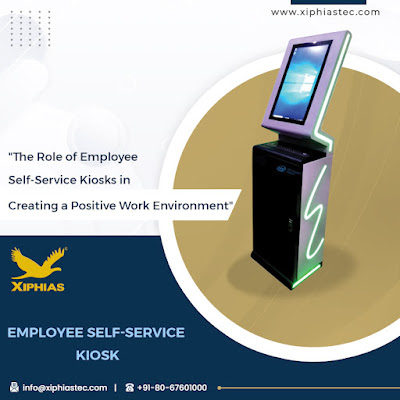The Role of Employee Self-Service Kiosks in Creating a Positive Work Environment?
In today's fast-paced world, technology has become an integral part of our daily lives. Many industries are leveraging technology to enhance their productivity and create a positive work environment. Employee self-service kiosks are one such technological innovation that has made significant strides in recent years. These kiosks enable employees to manage their work-related tasks on their own, without the need for constant supervision. In this blog post, we will explore the role of employee self-service kiosks in creating a positive work environment and how they can benefit both employees and employers.
What are Employee Self-Service Kiosks?
Employee self-service kiosks are interactive touch screen displays that allow employees to access various HR-related services and perform specific tasks without the need for human intervention. These kiosks are typically located in high-traffic areas such as break rooms or lobbies, making them easily accessible to all employees. Some of the common tasks that employees can perform using these kiosks include checking their work schedules, requesting time off, updating their personal information, and accessing important company policies and procedures.
How do Employee Self-Service Kiosks Create a Positive Work Environment?
Employee self-service kiosks offer several benefits that contribute to a positive work environment. Here are some of the ways in which these kiosks can help create a better workplace:
Improved Efficiency and Productivity:
By allowing employees to manage their tasks on their own, self-service kiosks eliminate the need for constant supervision, freeing up time for managers and HR personnel to focus on other important tasks. This increased efficiency can help to boost productivity and reduce the workload of HR staff, allowing them to focus on more strategic initiatives.Greater Convenience:
With employee self-service kiosks, employees can access HR-related services at any time, from anywhere, without having to wait for assistance. This convenience can be especially helpful for employees who work remotely or have non-traditional work schedules.Increased Employee Engagement:
When employees have access to self-service kiosks, they feel more in control of their work-related tasks and are more engaged with their jobs. This increased engagement can lead to higher job satisfaction and lower turnover rates.Enhanced Communication:
Employee self-service kiosks can serve as a central hub for company communication, providing employees with access to important company news and updates, as well as relevant HR-related information.Improved Data Accuracy:
With self-service kiosks, employees can update their personal information directly, reducing the likelihood of errors or discrepancies in the company's HR data. This improved data accuracy can help to ensure compliance with legal requirements and reduce the risk of penalties or fines.Benefits for Employers
While employee self-service kiosks primarily benefit employees, they also offer several advantages for employers. Here are some of the ways in which these kiosks can help organizations:
Reduced HR Workload:
With employees able to manage their tasks on their own, HR personnel can focus on more strategic initiatives, such as employee development and retention, rather than spending time on administrative tasks.Cost Savings:
Self-service kiosks can help to reduce the cost of HR administration by eliminating the need for additional staff to manage routine tasks.Increased Efficiency:
By streamlining HR-related processes, employee self-service kiosks can help to improve overall efficiency and productivity, reducing the time and resources needed to manage these tasks manually.Improved Compliance: Self-service kiosks can help to ensure compliance with legal requirements by reducing the risk of errors or discrepancies in HR data.
Conclusion
Employee self-service kiosks are an excellent tool for improving the efficiency and productivity of HR-related tasks while creating a positive work environment. These kiosks offer many benefits to both employees and employers, including improved efficiency, greater convenience, increased employee engagement, enhanced communication, improved data accuracy, reduced HR workload, cost savings, increased efficiency, and improved compliance. By implementing self-service kiosks, organizations can empower their employees to manage their tasks independently, freeing up HR personnel to focus on more strategic initiatives. This increased efficiency can lead to a more positive work environment, with engaged employees who feel in control of their work-related tasks.
However, it's essential to note that employee self-service kiosks should not replace the human touch entirely. While these kiosks are a useful tool for HR-related tasks, they should not replace the need for human interaction and support. HR personnel should still be available to answer any questions or concerns employees may have, and regular communication should be maintained to ensure that employees feel supported and valued.
In conclusion, employee self-service kiosks are a valuable asset to any organization looking to create a positive work environment. By empowering employees to manage their tasks independently and streamlining HR-related processes, self-service kiosks can help to improve overall efficiency and productivity while reducing costs and workload. With the right approach and support, employee self-service kiosks can be an essential tool in creating a more engaged and satisfied workforce.
👉 Contact us for Employee Self-Service Kiosk



This post explains such an useful information, Thanks a lot for sharing such a post.
ReplyDeleteguidance for phd formats